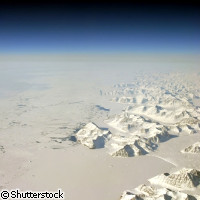Greenland ice core points to rapid climate change
Ice cores from Greenland reveal evidence of two periods of rapid warming which occurred towards the end of the last ice age. Furthermore, analyses of the ice point to climate changes taking place elsewhere in the world at that time. The findings, which are published online by the journal Science, will help scientists to refine existing computer models for predicting future climate change. Studies of the ice show that the temperature in the northern hemisphere rose by as much as 10°C in just a few decades on two occasions. The first change happened 14,700 years ago, when the planet was still in the grip of the last ice age. The subsequent warmer period lasted less than 2,000 years before the climate cooled again. The second switch to warmer temperatures occurred 11,700 years ago, at the end of the ice age. 'We have analysed the transition from the last glacial until our present warm interglacial period, and the climatic shifts are happening so suddenly as if somebody had pushed a button,' commented Professor Dorthe Dahl-Jensen of the University of Copenhagen in Denmark. Analyses of the ice core lead the researchers to suggest that the abrupt warming was caused by fundamental shifts in atmospheric circulation which happened from one year to the next. Both warming events were preceded by a fall in the amounts of dust deposited on Greenland. This indicates that the Asian deserts which supply this dust were experiencing higher temperatures and increased rainfall at that time. 'Even though the climatic changes at the end of the ice age are seen most violently in the northern Atlantic regions, our measurements suggest that they are initiated by changes in the tropical areas,' said Professor Dahl-Jensen. 'We can also see that when abrupt climate change is going on, it is the atmospheric circulation that has changed fundamentally.' 'We are beginning to tease apart the sequence of abrupt climate change,' added Jim White of the University of Colorado in the US. 'Since such rapid climate change would challenge even the most modern societies to successfully adapt, knowing how these massive events start and evolve is one of the most pressing climate questions we need to answer.' The ice core was studied in the framework of the international NorthGRIP (North Greenland Ice Core Project) initiative, which is led by the Niels Bohr Institute at the University of Copenhagen.



